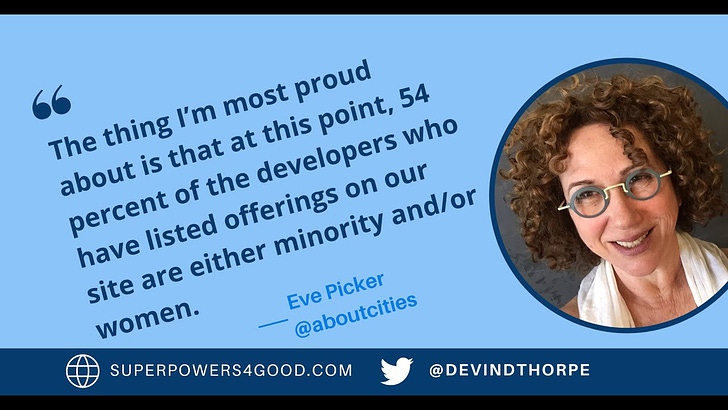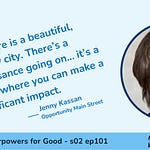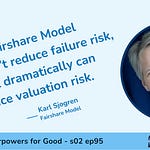Devin: What do you think of as your superpower?
Eve: My superpower is when someone says “no” to me, that just makes me go harder. Seriously, I have incredible stick-to-it-iveness. My superpower is endurance.
Eve Picker’s extraordinary career has evolved from a Columbia-trained architect to a community-focused developer to a tech entrepreneur who helps developers who share her passion. Her company, Small Change, is a FINRA-registered crowdfunding portal that helps people raise money for real estate projects with a social impact.
Eve will be speaking at SuperCrowd22 in September. The event is for anyone interested in building stronger communities or solving social problems. Participants will learn how to raise money from the crowd or invest for impact and a financial return. Eve will speak on how to invest in real estate for community impact.
Creating Small Change
Raised in Australia, Eve studied architecture at the University of New South Wales and later earned a master’s degree in urban design from Columbia University. She loves cities.
She “unexpectedly” found herself moving to Pittsburgh a few decades ago and describes it as “transformational.”
Her experience growing up in Australia with its large, cosmopolitan cities differed dramatically from rust-belt Pittsburgh. Since its peak, the city’s population has roughly halved.
“Downtown Pittsburgh is one of the most beautiful little downtowns you’ve ever seen,” Eve says of her adopted home. “Really stunning, gorgeous architecture. And yet the remainder of the city was half empty.”
“I moved into a neighborhood that was right next to one of the wealthiest neighborhoods in Pittsburgh,” she says. “On the other side of it was one of the poorest and most racially divided.”
That was the context that helped motivate her choice to start making a difference. “I became involved in founding a community development corporation and started doing real estate development in the nonprofit realm as a volunteer, and just fell in love with it.”
She became enthralled by the process of turning vacant ground into something tangible with real benefit for the community. “I quit architecture, actually, and I became a developer.”
She focused on building projects that others often said couldn’t be done. “I just wanted to make a difference.”
When she was working on what was ultimately a profitable loft project downtown, someone said to her, “Oh, honey, no one’s going to live downtown.”
Eve credits two women bankers for her success as a developer.
Leading up to the Great Recession, two things changed. Bank consolidation reduced the number of banks with an appetite for community development. The Bush Administration reduced funding for community development block grants, the source of critical funding for her projects.
She decided to wrap up her development business.
Before long, however, a builder tipped her off to the JOBS Act, which authorized Regulation Crowdfunding, making Small Change possible.
Eve immediately saw the potential. “I thought, well, maybe I wouldn’t have had to shut down my business if my neighbors could have been my investors.”
With that clarity, she founded Small Change and figured out how to become a tech entrepreneur.
Defining Community Impact
One of the critical challenges for Eve when she launched Small Change was how to define the idea of social impact. She wants to have only projects with a social benefit on the site.
First, she looked for a standard she could borrow from the ESG (environmental, social and governance-screened securities) investing community. She couldn’t find one she liked, so she created her own change index.
“That index really looks at everyday things that everyone understands,” Eve says. She listed some of the measures the index includes:
Walkability
Bikeability
Access to transit
Proximity to shops, especially grocery stores
Sustainability
Small Change scores every project on the site. “Some people are focused on environmental impact, but I think there’s community and other impact—and they’re all intertwined,” Eve says.
In addition to questions about the projects, there are important considerations in who leads them.
“The thing I’m most proud about is that at this point, 54 percent of the developers who have listed offerings on our site are either minority and/or women, which is—considering the state of the industry—a remarkable statistic,” Eve says.
Over the years, a wide range of projects, from nonprofit housing for low-income BIPOC people to rural redevelopment projects for which traditional financing is limited. Everything offered on the site meets Eve’s test for impact.
Eve thinks of her endurance and stick-to-itiveness—her ability to be fired up by a challenge—as her superpower.
How to Develop Endurance As a Superpower
Everything Eve has accomplished is a testament to her endurance, her unstoppable nature and her stick-to-itiveness. She sees the 8-unit loft development early in her career as a developer as an early manifestation. Small Change is echoing evidence of her superpower.
“When I started down this path, I honestly didn’t even know what a security was,” she says of the experience of launching the securities portal. “I had to educate myself. And then I had to read the 650 pages of Regulation Crowdfunding when they came out.”
Then she had to figure out how to apply the rules in a technology business and build it. “And, by the way, I had never built a technology platform before!”
She is unstoppable.
She sees learning to “chunk things” in her training to become an architect as key to learning endurance.
First, you start with a vision that you polish and refine.
Second, you start figuring out how to implement your vision.
She notes that it is iterative, meaning that the vision may get tweaked as you learn more about implementation.
With each iteration, you get a bit more detailed. Draft and redraft.
Eventually, you operate at a level of detail that allows you to begin taking action, moving forward and making progress. Then, you are unstoppable like Eve.
If you follow Eve’s example and advice, you can make endurance a superpower that will make you unstoppable.

















Share this post